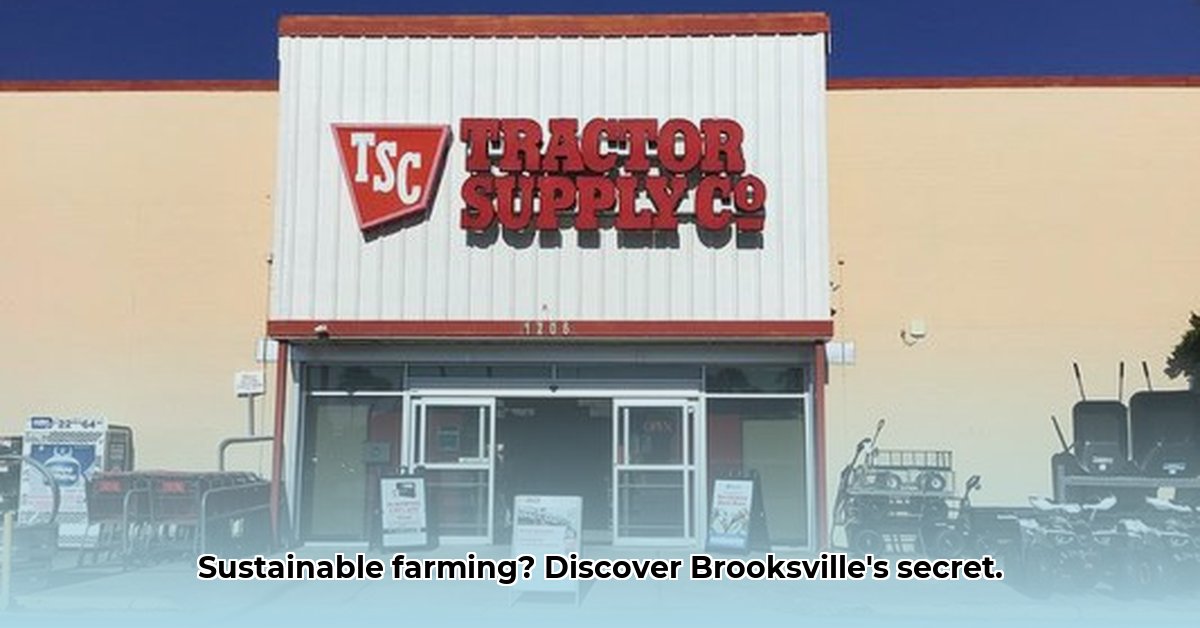
Tractor Supply (TSC) plays a crucial role in Brooksville's agricultural landscape. This article examines TSC's contribution to sustainable farming, highlighting both its strengths and areas for improvement. We'll explore its product offerings, analyze its local impact, and provide actionable steps for TSC, farmers, consumers, and local government to foster a more sustainable agricultural future. For similar operations in other areas, see information on other Tractor Supply stores.
Tractor Supply's Brooksville Offerings: Supporting Sustainable Practices
TSC in Brooksville offers a range of products that can support sustainable farming practices. These include organic seeds (allowing for crop diversification), water-efficient irrigation tools (crucial for water conservation), and tools designed to minimize soil disturbance (promoting soil health). However, the store's overall commitment to sustainability requires a closer look. The availability of organic fertilizers and sustainably sourced products, for example, needs further investigation. Are these options readily available, or are they overshadowed by less sustainable alternatives? Transparency around product sourcing and environmental impact is crucial.
Analyzing Local Impact: Progress and Opportunities
TSC's presence undeniably benefits Brooksville's economy and food production. Local farmers rely on TSC for essential supplies, bolstering the local agricultural system and contributing to food security. This is a significant positive contribution. However, a detailed assessment of the environmental impact of the products sold is lacking. More information is needed on the sourcing of fertilizers (are they primarily chemical-based or organic?), seed origins, and the overall environmental footprint of the supply chain. While TSC's economic contribution is clear, its holistic commitment to sustainability needs further examination and improvement.
Actionable Steps for a Greener Agricultural Future
To maximize its positive impact, TSC and the wider community need to collaborate on measurable improvements.
For Tractor Supply (TSC):
- Conduct Life Cycle Assessments (LCAs): Perform comprehensive LCAs (analyses of a product's environmental impact from cradle to grave) on key products to identify and address environmental hotspots. This data-driven approach will inform more effective sustainability strategies.
- Publish a Transparent Sustainability Report: Annually release a public report detailing sourcing practices, waste reduction initiatives, carbon footprint, and progress towards ambitious sustainability goals. This crucial step builds trust and accountability.
- Prioritize Sustainable Sourcing: Actively seek and partner with suppliers committed to sustainable practices, increasing the availability of organic and sustainably produced goods.
For Local Farmers:
- Efficient Resource Management: Adopt efficient farming practices, including precise irrigation techniques and soil conservation methods, to minimize resource waste.
- Embrace Continuing Education: Invest in training and educational resources related to sustainable farming techniques, both from TSC and other reputable sources. This continuous learning fosters innovation and improves outcomes.
For Consumers:
- Support Sustainable Choices: Prioritize organic and sustainably sourced products whenever possible, signaling consumer demand for environmentally friendly options.
- Engage with TSC: Directly engage with TSC to inquire about their sustainability efforts, encouraging further transparency and action. Your questions directly influence their policies.
For Government Agencies:
- Incentivize Sustainable Practices: Implement policies, such as subsidies or tax breaks, to encourage local farmers to adopt sustainable agricultural practices.
- Collaborate with Businesses: Foster partnerships with businesses like TSC to promote sustainable agriculture and provide educational resources to the wider community.
Addressing Challenges & Capitalizing on Opportunities
While TSC has made progress toward sustainable practices, challenges remain. Supply chain disruptions, potentially harmful environmental impacts of certain products, evolving consumer demands, and regulatory changes all present obstacles. However, these challenges present opportunities for innovation and improvement. By proactively addressing these risks through mitigation strategies such as improved supply chain management, enhanced environmental impact assessments, consumer education, and regulatory compliance, Tractor Supply can solidify its position as a leader in sustainable agriculture.
Conclusion: Toward a Sustainable Future Together
Tractor Supply in Brooksville holds significant potential to promote sustainable farming within the community. Realizing this potential requires collective action by all stakeholders. Through increased transparency, proactive sustainability initiatives, and consistent consumer engagement, TSC and other partners can cultivate a healthier and more sustainable agricultural future. The journey toward sustainable agriculture is a continuous process, demanding commitment and collaboration.